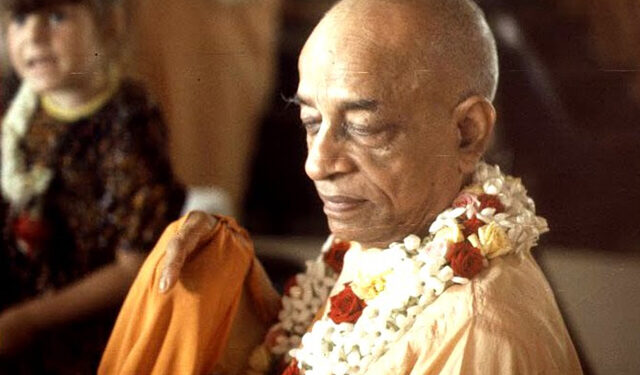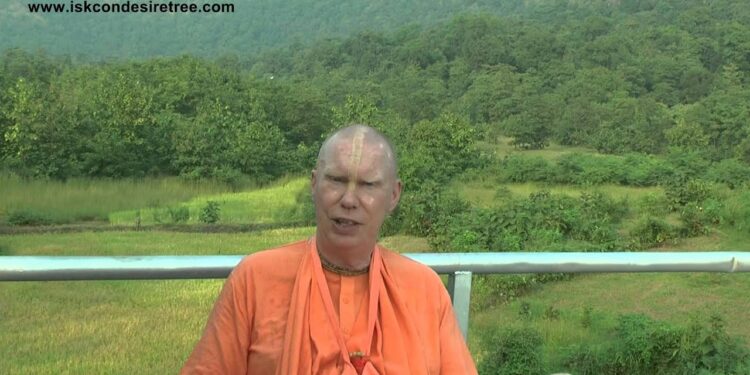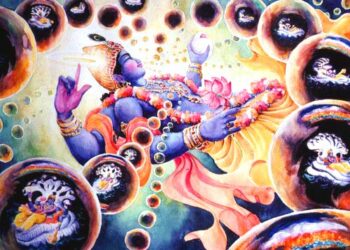It was 10 November and we were on a morning walk on Juhu beach with Śrīla Prabhupāda. Brahmānanda Dāsa, Yaśomatīnandana Dāsa and Dr. Patel were among some of the devotees present. A lengthy conversation about the chanting of sixteen rounds ensued.
“Is it possible to chant within one’s mind?” I asked.
“Chanting means that your tongue must be engaged, Hare Kṛṣṇa, Hare Kṛṣṇa, Kṛṣṇa Kṛṣṇa” chanted Śrīla Prabhupāda, “that is chanting, real chanting.”
Śrīla Prabhupāda continued, “Chant means you must vibrate your tongue. That is chanting, Hare Kṛṣṇa. Where it is said? It is never said, ‘You chant within the mind?”
Whilst on the topic of chanting, I enquired further, “Why do we chant sixteen rounds? Why that specific number? Why not less or more?”
Śrīla Prabhupāda replied, “If you can chant sixteen thousand you can go. Sixteen rounds is the minimum. But if you are able to chant sixteen thousand rounds, that is welcome. We have got so much engagement. Still, we say, ‘We don’t find engagement.’ This is our misfortune. Hare Kṛṣṇa! Jaya! Haridāsa Ṭhākura was engaged in chanting and the prostitute came. She offered, ‘Let us enjoy.’ ‘Yes, let me finish. Let me finish this chanting,’ he replied to her. So much engagement, and still, we say, ‘No engagement.’ He refused to have sex with a beautiful young girl because he had engagement. First of all let me finish my engagement, and we say we have no engagement.”
I then mentioned to Śrīla Prabhupāda that some devotees had set a different number of daily rounds for themselves. Some were doing a minimum of twenty to twenty-five rounds of chanting. “Should we also consider increasing our daily number of rounds?” I asked.
“Yes,” said Śrīla Prabhupāda, “It should be increased. But don’t decrease. Don’t decrease… increase. Therefore one number is fixed. At least this much I shall do. That is sixteen rounds.”
“But you are recommending sixteen as a minimum, and some devotees are choosing twenty as a minimum,” I persisted. Śrīla Prabhupāda replied, “So who forbids? Who says, ‘Don’t do it?’”
“So they can chant?” I continued curiously. I was trying to rationalize and confirm the number of rounds that Śrīla Prabhupāda felt was best to be done daily.
Śrīla Prabhupāda nodded, “Yes. That is wanted. But because you cannot do it, therefore we have fixed up this minimum. Saṅkhyāta asaṅkhyāta. Saṅkhyāta means ‘with vow, numerical strength’. And asaṅkhyāta means ‘there is no limit’.”
I enquired further, “If we chant more than sixteen rounds, how can we know whether we are imitating Haridāsa Ṭhākura or following in his footsteps?”
Śrīla Prabhupāda smiled, “Imitation is also good. If you imitate Haridāsa Ṭhākura, that is also your great fortune. Imitating, it does not mean you are condemned. Even if you imitate, that is also good. If you have some other business and if you say, ‘Now I am imitating Haridāsa Ṭhākura, I cannot do it,’ that is very bad or ‘I am busy in imitating Haridāsa Ṭhākura,’ that is not good. That is very bad!”
Brahmānanda quipped, “If the devotees are asked for service they say, ‘Oh, I have to chant’.”
Śrīla Prabhupāda nodded, “If I am imitating. ‘Yes. I am imitating Haridāsa. This is my first business so I cannot do service.’ That is very bad.”
Śrīla Prabhupāda stressed here that we should imitate Haridāsa Ṭhākura for the right reasons, and that is to aspire to perfect our quality and quantity of rounds chanted, and not as a means to inflate one’s ego or avoid service. Śrīla Prabhupāda’s requirement was also clear. The devotee should chant sixteen rounds a day as a set number. Haridāsa Ṭhākura and the six Gosvāmīs were all engaged in chanting a fixed number of rounds. Fixing the number of rounds was important to maintain consistency. Increasing was fine, but decreasing the number of rounds chanted, was frowned upon.
How loudly you chant is a personal choice. Śrīla Prabhupāda encouraged the devotees to chant the holy name loudly during kīrtana, but when you are chanting japa together with others in a temple room or elsewhere, you should not interfere with other people’s chanting by being too loud with your own rounds. It is stated in the Madhya-līlā, “The chanting is a spiritual call for the Lord and His energy to give protection to the conditioned soul. The chanting is exactly like the genuine cry of a child for its mother’s presence.”
The message was very clear from Śrīla Prabhupāda. “Chanting means that your tongue must be engaged.”
Source: Bombay 1975, In Conversation with Śrīla Prabhupāda – Lokanāth Swami



















